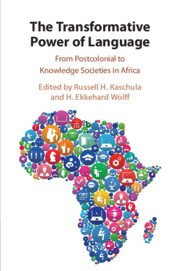Book contents
- The Transformative Power of Language
- The Transformative Power of Language
- Copyright page
- Contents
- Figures
- Tables
- Contributors
- Preface
- Abbreviations and Acronyms
- Introduction
- Part I Mental Decolonisation and Cultural Diversity
- Part II Multilingualism and Intellectualisation of African Languages
- Part III Digitalisation and Democratisation of Knowledge
- 10 African Language Resources for Knowledge Societies
- 11 Wikipedia as a Transformative Multilingual Knowledge Resource
- 12 Corpora as Agency in the Intellectualisation of African Languages
- 13 From Postcolonial African Language Lexicography to Globally Competitive e-Lexicography in Africa
- Part IV Interlingual and Intercultural Cross-Fertilisation
- Index
- References
10 - African Language Resources for Knowledge Societies
from Part III - Digitalisation and Democratisation of Knowledge
Published online by Cambridge University Press: 18 September 2020
- The Transformative Power of Language
- The Transformative Power of Language
- Copyright page
- Contents
- Figures
- Tables
- Contributors
- Preface
- Abbreviations and Acronyms
- Introduction
- Part I Mental Decolonisation and Cultural Diversity
- Part II Multilingualism and Intellectualisation of African Languages
- Part III Digitalisation and Democratisation of Knowledge
- 10 African Language Resources for Knowledge Societies
- 11 Wikipedia as a Transformative Multilingual Knowledge Resource
- 12 Corpora as Agency in the Intellectualisation of African Languages
- 13 From Postcolonial African Language Lexicography to Globally Competitive e-Lexicography in Africa
- Part IV Interlingual and Intercultural Cross-Fertilisation
- Index
- References
Summary
This chapter is concerned with the potential role of African languages in current-day information communication systems contributing to the creation of local knowledge societies. The characteristics of the concepts Information Society and Knowledge Society as well as criteria for defining these concepts are discussed. This will take place against the backdrop of international assessments of the status and development of African countries being transformed to knowledge societies. The role of language in the creation of knowledge societies is highlighted referring to the impact of the Internet as one of the mediators of knowledge. In many postcolonial countries, an awareness of local knowledge has given rise to the acknowledgement of Indigenous Knowledge Systems, which in principle strive towards the expression of knowledge in a particular vernacular. It is argued that while it is absolutely necessary to capture and disseminate particular types of knowledge in local languages, it is equally important to open up these troves of knowledge to global societies. The final section focuses on the nature of digital resources and the potential role of Digital Humanities (DH) and language technologies in the creation of new knowledge, and the scope it provides for new types of research moving away from traditional research paradigms in the humanities and social sciences.
Keywords
- Type
- Chapter
- Information
- The Transformative Power of LanguageFrom Postcolonial to Knowledge Societies in Africa, pp. 209 - 231Publisher: Cambridge University PressPrint publication year: 2020
References
References
Reports
- 1
- Cited by



